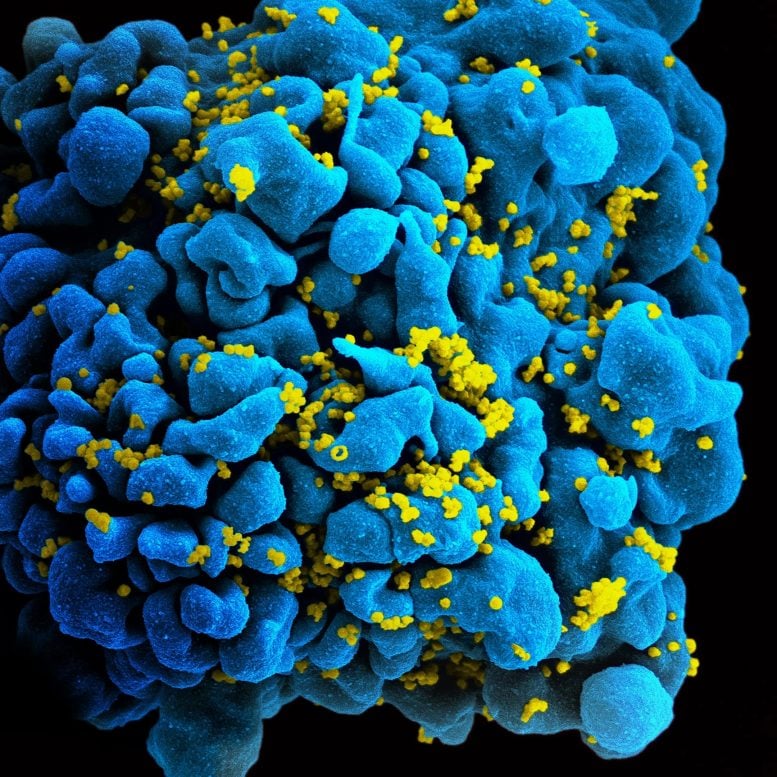
An immunomodulatory drug called fingolimod, which is approved for the treatment of multiple sclerosis, blocks human immunodeficiency virus (HIV) infection and transmission in human immune cells, according to a study published August 13 in the open-access journal PLOS Pathogens by Postdoctoral Fellow Rachel Resop and Assistant Professor Alberto Bosque of The George Washington University, and colleagues. These preliminary findings suggest that this compound may be a promising novel therapy for HIV treatment and prevention. Credit: NIAID
An immunomodulatory drug called fingolimod, which is approved for the treatment of multiple sclerosis, blocks human immunodeficiency virus (HIV) infection and transmission in human immune cells, according to a study published today (August 13, 2020) in the open-access journal PLOS Pathogens by Postdoctoral Fellow Rachel Resop and Assistant Professor Alberto Bosque of The George Washington University, and colleagues. Although future studies in animals and humans are needed, these preliminary findings suggest that this compound may be a promising novel therapy for HIV treatment and prevention.
Nearly 40 million people worldwide currently live with HIV. Treatment of infection is lifelong, due to the ability of the virus to establish latency by integrating its genome into that of host cells, resulting in potential viral reactivation at a future time. By establishing latency, HIV evades eradication by host defense mechanisms and drug treatment. HIV is currently managed by antiretroviral drugs, which do not specifically target latent infection, may have side effects, and are of limited use in preventing transmission of the virus between individuals. For this reason, the discovery of novel strategies to target HIV infection and latency is crucial.
Bosque and colleagues investigated an alternative tactic to combat HIV infection by targeting Sphingosine-1-phosphate (S1P) receptors– a component of the immune system involved in the progression of infection. To do so, they focused on FTY720 (fingolimod) – a well-tolerated drug that blocks the action of S1P receptors and is approved by the U.S. Food and Drug Administration. They found that FTY720 blocks HIV infection in human immune cells called CD4+ T cells by hindering multiple steps in the HIV lifecycle. For example, FTY720 reduces the density of CD4 – a protein found on the surface of T cells — thereby inhibiting viral binding and fusion. The drug blocked HIV transmission between the cells, and consequently reduced detectable latent virus. According to the authors, the role of S1P signaling in the establishment of HIV infection, and the potential to modulate this pathway to alter the course of infection or prevent establishment of the latent reservoir in CD4+ T cells, had not been previously reported. As such, targeting the S1P pathway with FTY720 could be a novel strategy to inhibit HIV replication and reduce the latent reservoir.
The authors note, “These results indicate that Fingolimod merits further investigation as an exciting novel therapy for HIV.”
Reference: “Fingolimod inhibits multiple stages of the HIV-1 life cycle” by Rachel S. Resop, Rémi Fromentin, Daniel Newman, Hawley Rigsby, Larisa Dubrovsky, Michael Bukrinsky, Nicolas Chomont and Alberto Bosque, 13 August 2020, PLOS Pathogens.
DOI: 10.1371/journal.ppat.1008679
Funding: Research reported in this publication was partially supported by the NIAID (https:/


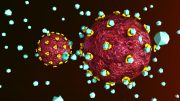
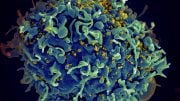
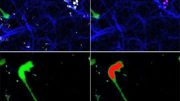


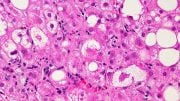
Be the first to comment on "Drug, Already Approved to Treat Multiple Sclerosis, Blocks HIV Infection and Transmission in Human Immune Cells"